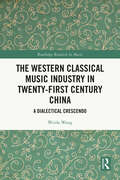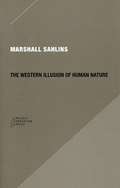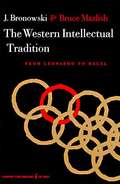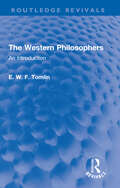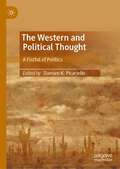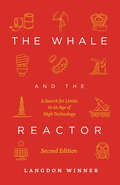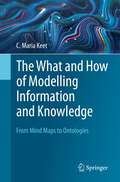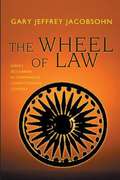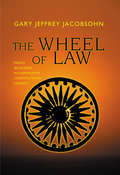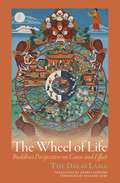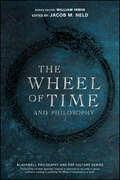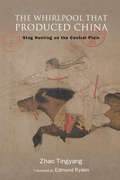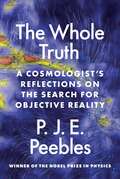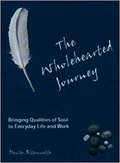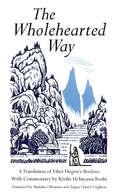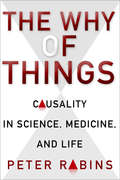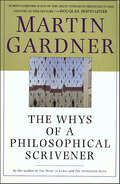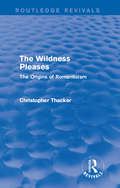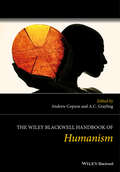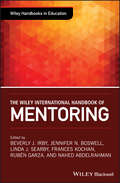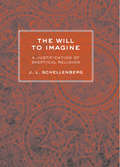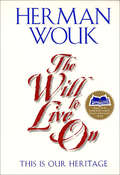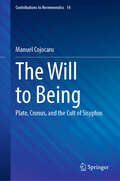- Table View
- List View
The Western Classical Music Industry in Twenty-First Century China: A Dialectical Crescendo (Routledge Research in Music)
by Weida WangWeida Wang explores how Western classical music (WCM) has become increasingly popular in China, framing the industry as a complex entity intricately embedded within China’s political landscape, cultural economy, and cultural industries. Wang highlights how authorities and organisers strive to build powerful brands to support the industry’s growth, aiming to tap into the vast domestic market and showcase China’s achievements in WCM on the global stage as part of broader cultural diplomacy efforts. The study delves into the mechanisms and underlying logics driving the rapid expansion of the WCM market in contemporary China.With the rise of China’s economy since its government’s late-1970s economic and political reform, WCM has become a useful tool for showcasing changes to the image of ‘modern’ and ‘contemporary’ China. At the same time, a new Chinese middle class, following the rapid economic (and cultural) development in China’s coastal cities, has also emerged, becoming a substantial demographic involved in the learning, appreciation, and consumption of WCM. Especially in the past 20 years, a new WCM scene has developed quickly and established as an industry in China; one critically enmeshed in both the business and political worlds. Many ground-breaking cultural events have taken place in the last decades. These have shown themselves to be huge forces behind the development of China’s domestic (and fledgling international) classical music aspirations.The book will be valuable for those interested in arts/music management, music industry studies, China studies, cultural and creative industry studies, and ethnomusicology.
The Western Illusion of Human Nature: With Reflections on the Long History of Hierarchy, Equality, and the Sublimation of Anarchy in the West, and Comparative Notes on Other Conceptions of the Human Condition
by Marshall SahlinsReflecting the decline in college courses on Western Civilization, Marshall Sahlins aims to accelerate the trend by reducing "Western Civ" to about two hours. He cites Nietzsche to the effect that deep issues are like cold baths; one should get into and out of them as quickly as possible. The deep issue here is the ancient Western specter of a presocial and antisocial human nature: a supposedly innate self-interest that is represented in our native folklore as the basis or nemesis of cultural order. Yet these Western notions of nature and culture ignore the one truly universal character of human sociality: namely, symbolically constructed kinship relations. Kinsmen are members of one another: they live each other's lives and die each other's deaths. But where the existence of the other is thus incorporated in the being of the self, neither interest, nor agency or even experience is an individual fact, let alone an egoistic disposition. "Sorry, beg your pardon," Sahlins concludes, Western society has been built on a perverse and mistaken idea of human nature.
The Western Intellectual Tradition: From Leonardo to Hegel
by Jacob Bronowski Bruce MazlishThe history of science has been successfully integrated with other intellectual and political developments in the Western tradition, instead of being cut off as a recondite specialty untouched by the humanists. The method used by Brunswick and Mazlish is to select twenty-five or more key persons or events and to weave the whole chronicle of Western thought from Leonardo to Hegel (inclusive) around them. Their work is therefore less abstract than some histories of thought of a similar compass, since it does not hesitate to deal with specific persons and even political events: intellectual history is not reduced to themes and elements. The individual chapters, since they are really examples, present the newest learned evidence with some detail and even indicate the scholarly controversies that are involved. References to the learned literature in these essays are invariably apt.
The Western Philosophers: An Introduction (Routledge Revivals)
by E. W. TomlinFirst published in 1950, The Western Philosophers presents the life of philosophical thought in the Western world. From Socrates to Spinoza, from John Locke to Nietzsche, the author gives a good introduction for anyone who is wondering what philosophy is about and provides an initiation into the subject. The author argues that philosophy is not simply the collective works of great philosophers. Philosophy is an attitude of mind; at bottom it is nothing but that irrepressible impulse towards enquiry, that itch to probe at the meaning of things, which is the spur behind science itself. This book is an essential read for students of Philosophy.
The Western and Political Thought: A Fistful of Politics
by Damien K. PicarielloThe Western and Political Thought: A Fistful of Politics offers a variety of engaging and entertaining answers to the question: What do Westerns have to do with politics? This collection features contributions from scholars in a variety of fields—political science, English, communication studies, and others—that explore the connections between Westerns (prose fiction, films, television series, and more) and politics.
The Whale and the Reactor: A Search for Limits in an Age of High Technology, Second Edition
by Langdon Winner“In an age in which the inexhaustible power of scientific technology makes all things possible, it remains to be seen where we will draw the line, where we will be able to say, here are possibilities that wisdom suggest we avoid.” First published to great acclaim in 1988, Langdon Winner’s groundbreaking exploration of the political, social, and philosophical implications of technology is timelier than ever. He demonstrates that choices about the kinds of technical systems we build and use are actually choices about who we want to be and what kind of world we want to create—technical decisions are political decisions, and they involve profound choices about power, liberty, order, and justice. A seminal text in the history and philosophy of science, this new edition includes a new chapter, preface, and postscript by the author.
The What and How of Modelling Information and Knowledge: From Mind Maps to Ontologies
by C. Maria KeetThe main aim of this book is to introduce a group of models and modelling of information and knowledge comprehensibly. Such models and the processes for how to create them help to improve the skills to analyse and structure thoughts and ideas, to become more precise, to gain a deeper understanding of the matter being modelled, and to assist with specific tasks where modelling helps, such as reading comprehension and summarisation of text. The book draws ideas and transferrable approaches from the plethora of types of models and the methods, techniques, tools, procedures, and methodologies to create them in computer science. This book covers five principal declarative modelling approaches to model information and knowledge for different, yet related, purposes. It starts with entry-level mind mapping, to proceed to biological models and diagrams, onward to conceptual data models in software development, and from there to ontologies in artificial intelligence and all the way to ontology in philosophy. Each successive chapter about a type of model solves limitations of the preceding one and turns up the analytical skills a notch. These what-and-how for each type of model is followed by an integrative chapter that ties them together, comparing their strengths and key characteristics, ethics in modelling, and how to design a modelling language. In so doing, we’ll address key questions such as: what type of models are there? How do you build one? What can you do with a model? Which type of model is best for what purpose? Why do all that modelling? The intended audience for this book is professionals, students, and academics in disciplines where systematic information modelling and knowledge representation is much less common than in computing, such as in commerce, biology, law, and humanities. And if a computer science student or a software developer needs a quick refresher on conceptual data models or a short solid overview of ontologies, then this book will serve them well.
The Wheel of Law: India's Secularism in Comparative Constitutional Context
by Gary Jeffrey JacobsohnHow can religious liberty be guaranteed in societies where religion pervades everyday life? In The Wheel of Law, Gary Jacobsohn addresses this dilemma by examining the constitutional development of secularism in India within an unprecedented cross-national framework that includes Israel and the United States. He argues that a country's particular constitutional theory and practice must be understood within its social and political context. The experience of India, where religious life is in profound tension with secular democratic commitment, offers a valuable perspective not only on questions of jurisprudence and political theory arising in countries where religion permeates the fabric of society, but also on the broader task of ensuring religious liberty in constitutional polities. India's social structure is so entwined with religion, Jacobsohn emphasizes, that meaningful social reform presupposes state intervention in the spiritual domain. Hence India's "ameliorative" model of secular constitutionalism, designed to ameliorate the disabling effects of the caste system and other religiously based practices. Jacobsohn contrasts this with the "visionary" secularism of Israel, where the state identifies itself with a particular religion, and with America's "assimilative" secularism. Constitutional globalization is as much a reality as economic globalization, Jacobsohn concludes, and within this phenomenon the place of religion in liberal democracy is among the most vexing challenges confronting us today. A richly textured account of the Indian experience with secularism, developed in a broad comparative framework, this book is for all those seeking ways to respond to this challenge.
The Wheel of Law: India's Secularism in Comparative Constitutional Context
by Gary Jeffrey JacobsohnHow can religious liberty be guaranteed in societies where religion pervades everyday life? In The Wheel of Law, Gary Jacobsohn addresses this dilemma by examining the constitutional development of secularism in India within an unprecedented cross-national framework that includes Israel and the United States. He argues that a country's particular constitutional theory and practice must be understood within its social and political context. The experience of India, where religious life is in profound tension with secular democratic commitment, offers a valuable perspective not only on questions of jurisprudence and political theory arising in countries where religion permeates the fabric of society, but also on the broader task of ensuring religious liberty in constitutional polities. India's social structure is so entwined with religion, Jacobsohn emphasizes, that meaningful social reform presupposes state intervention in the spiritual domain. Hence India's "ameliorative" model of secular constitutionalism, designed to ameliorate the disabling effects of the caste system and other religiously based practices. Jacobsohn contrasts this with the "visionary" secularism of Israel, where the state identifies itself with a particular religion, and with America's "assimilative" secularism. Constitutional globalization is as much a reality as economic globalization, Jacobsohn concludes, and within this phenomenon the place of religion in liberal democracy is among the most vexing challenges confronting us today. A richly textured account of the Indian experience with secularism, developed in a broad comparative framework, this book is for all those seeking ways to respond to this challenge.
The Wheel of Life: Buddhist Perspectives on Cause and Effect
by Dalai Lama Jeffrey Hopkins Richard GereUsing the traditional Buddhist allegorical image of the Wheel of Life and the teaching of the twelve links of dependent origination, the Dalai Lama deftly illustrates how our existence, though fleeting and often full of woes, brims with the potential for peace and happiness. We can realize that potential by cultivating a wise appreciation of the interdependency of actions and experience, and by living a kind and compassionate life. A life thus lived, the Dalai Lama teaches, becomes thoroughly meaningful for both oneself and for others.
The Wheel of Time and Philosophy: A Portion of Wisdom (The Blackwell Philosophy and Pop Culture Series)
by William IrwinDelve through a unique exploration of the philosophy underlying The Wheel of Time “The Wheel of Time turns, and ages come and pass, leaving memories that become legend. Legend fades to myth, and even myth is long forgotten…” Robert Jordan's The Wheel of Time is a story of mythic proportions, following Rand al'Thor, the Dragon Reborn, as he marches toward Tarmon Gai'don, the last battle between the forces of good and evil. Male and Female ‘channelers’ wield complementary halves of the one power, some for good, others in service to the Dark One. But in a world of polar opposites, there is ambiguity. Rand, alongside his comrades, must navigate a complex world where anybody may be a Darkfriend and even dreams may be lethal, all while learning to become the heroes of legend they thought only existed in gleeman's tales. Drawing from both the beloved book series and the Amazon Prime adaptation, 18 scholars and fans provide readers with a deeper understanding of the ideas woven throughout the rich world of The Wheel of Time. Covering wide ranging themes from magic rooted in biological sex and the meaning of gender to Wolf-brothers and humanity's connection to the animal world, from slavery and servitude to pacifism and polyamory, these authors tackle issues paramount to understanding the human condition. Substantial yet accessible chapters address philosophical questions including: Could there be a world without evil? Who is the author of a work? Should we prefer existence to nothingness? Does fate determine our future, and does it matter? When, if ever, is war justified? Featuring contributions from scholars with expertise in philosophy, literature, and media studies, The Wheel of Time and Philosophy: A Portion of Wisdom is ideal a must-read for fans, philosophy students and scholars alike who wish to explore the deeper intellectual currents running through The Wheel of Time.
The Whirlpool That Produced China: Stag Hunting on the Central Plain (SUNY series in Chinese Philosophy and Culture)
by Tingyang ZhaoIn The Whirlpool That Produced China, Tingyang Zhao offers a philosophical interpretation of China's historicity, explaining how the expansion of China was not due to the lures of expansionist behavior but to the offerings of the surrounding contenders as they were constantly being pulled into a whirlpool of growth and amalgamation. The peoples surrounding China on all four sides sought to win the greatest material benefits and greatest spiritual resources by shaping their ways of thinking and living around the evolving core culture of the central plains. Zhao also investigates how the tianxia vision of world order was able to dissolve the fierce currents of contention and create out of them the inclusive model of many cultures and many peoples with many forms of governance. He explains these reasons for why China became China by weaving together ontology with game theory methodology: the "stag hunt." Ultimately, Zhao addresses the question of how ancient China became such an irresistible attraction—a stag—to its vital periphery that once a population and territory was drawn into the game, or the whirlpool, it was difficult if not impossible to withdraw.
The Whole Truth: A Cosmologist’s Reflections on the Search for Objective Reality
by P. J. PeeblesFrom the Nobel Prize–winning physicist, a personal meditation on the quest for objective reality in natural scienceA century ago, thoughtful people questioned how reality could agree with physical theories that keep changing, from a mechanical model of the ether to electric and magnetic fields, and from homogeneous matter to electrons and atoms. Today, concepts like dark matter and dark energy further complicate and enrich the search for objective reality. The Whole Truth is a personal reflection on this ongoing quest by one of the world’s most esteemed cosmologists.What lies at the heart of physical science? What are the foundational ideas that inform and guide the enterprise? Is the concept of objective reality meaningful? If so, do our established physical theories usefully approximate it? P. J. E. Peebles takes on these and other big questions about the nature of science, drawing on a lifetime of experience as a leading physicist and using cosmology as an example. He traces the history of thought about the nature of physical science since Einstein, and succinctly lays out the fundamental working assumptions. Through a careful examination of the general theory of relativity, Einstein’s cosmological principle, and the theory of an expanding universe, Peebles shows the evidence that we are discovering the nature of reality in successive approximations through increasingly rigorous scrutiny.A landmark work, The Whole Truth is essential reading for anyone interested in the practice of science.
The Whole World is a Single Flower
by Stephen Mitchell Seung SahnThis remarkable book is of great importance not only for the variety of the 365 kong-ans, but for Zen Master Seung Sahn's own questions and commentary which accompany each kong-an. This prodding and guidance serve as guideposts along a difficult road to enlightenment. The kong-ans themselves and practice for life-practice for life-practice for answering the questions which are profound and practical arising everyday.
The Wholehearted Journey: Bringing Qualities of Soul to Everyday Life and Work
by Denise Bissonnette<p>The Wholehearted Journey is a book of insights gleaned and distilled from a remarkably eclectic array of sources, drawing from the world's great wisdom traditions and culminating in a rich and illuminating guide for living a spirited and wholehearted life. <p>Simply put, this is a personal retreat in a book. Each chapter focuses on a particular quality of soulful living and offers a self-contained tutorial for applying it to everyday life and work. <p>Generously sprinkled with poetry, parables, penetrating questions and practical suggestions, The Wholehearted Journey equips us for a life of greater joy and authenticity. Perspectives on the themes of The Wholehearted Journey are enriched through the inclusion of quotations from over 400 writers, philosophers, teachers, poets, politicians, spiritual leaders and other sages. <p>Totally engaging, disarmingly honest and entirely delightful, The Wholehearted Journey is nevertheless an urgent call to each of us - to be mindful of our common humanity and to embrace, honor and celebrate this unique gift that is our life.</p>
The Wholehearted Way
by Taigen Dan Leighton Shohaku Okumura Kosho Uchiyama RoshiThe Wholehearted Way is a translation of Eihei Dogen's Bendowa, one of the primary texts on Zen practice. Transcending any particular school of Buddhism or religious belief, Dogen's profound and poetic writings are respected as a pinnacle of world spiritual literature. Bendowa, or A Talk on the Wholehearted Practice of the Way, was written in 1231 A.D. and expresses Dogen's teaching of the essential meaning of zazen (seated meditation) and its practice. This edition also contains commentary on Bendowa by Kosho Uchiyama Roshi, a foreword by Taigen Daniel Leighton, and an Introduction by Shohaku Okumura, both of whom prepared this English translation.
The Wholehearted Way
by Taigen Dan Leighton Shohaku Okumura Kosho Uchiyama RoshiThe Wholehearted Way is a translation of Eihei Dogen's Bendowa, one of the primary texts on Zen practice. Transcending any particular school of Buddhism or religious belief, Dogen's profound and poetic writings are respected as a pinnacle of world spiritual literature. Bendowa, or A Talk on the Wholehearted Practice of the Way, was written in 1231 A.D. and expresses Dogen's teaching of the essential meaning of zazen (seated meditation) and its practice. This edition also contains commentary on Bendowa by Kosho Uchiyama Roshi, a foreword by Taigen Daniel Leighton, and an Introduction by Shohaku Okumura, both of whom prepared this English translation.
The Why of Things: Causality in Science, Medicine, and Life
by Peter RabinsWhy was there a meltdown at the Fukushima power plant? Why do some people get cancer and not others? Why is global warming happening? Why does one person get depressed in the face of life's vicissitudes while another finds resilience? Questions like these—questions of causality—form the basis of modern scientific inquiry, posing profound intellectual and methodological challenges for researchers in the physical, natural, biomedical, and social sciences. In this groundbreaking book, noted psychiatrist and author Peter Rabins offers a conceptual framework for analyzing daunting questions of causality. Navigating a lively intellectual voyage between the shoals of strict reductionism and relativism, Rabins maps a three-facet model of causality and applies it to a variety of questions in science, medicine, economics, and more. Throughout this book, Rabins situates his argument within relevant scientific contexts, such as quantum mechanics, cybernetics, chaos theory, and epigenetics. A renowned communicator of complex concepts and scientific ideas, Rabins helps readers stretch their minds beyond the realm of popular literary tipping points, blinks, and freakonomic explanations of the world.
The Whys of a Philosophical Scrivener
by Martin GardnerThe Whys of a Philosophical Scrivener showcases Martin Gardner as the consummate philosopher, thinker, and great mathematician that he is. Exploring issues that range from faith to prayer to evil to immortality, and far beyond, Garnder challenges the discerning reader with fundamental questions of classical philosophy and life's greater meanings.Recalling such philosophers was Wittgenstein and Arendt, The Whys of Philosophical Scrivener embodies Martin Garner's unceasing interest and joy in the impenetrable mysteries of life.
The Wildness Pleases (Routledge Revivals): The Origins of Romanticism
by Christopher ThackerFirst published in 1983. This book charts the growth of Romanticism from the initial reactions to the authoritarian classicism of Louis XIV, through the ‘codification’ of the Sublime by Burke in the 1750s, to the fascination with mystery, fear and violence which dominated the writing of the late eighteenth century. The origins of the movement are found in the writings of Rousseau and admiration for the ‘noble savage’, the development of the landscape garden, discoveries in the South Seas, new approaches to ‘primitive’ poetry and enthusiasm for gothic art and literature. These attitudes are contrasted with the more classical views of writers like Samuel Johnson.
The Wiley Blackwell Handbook of Humanism
by A. C. Grayling Andrew CopsonThe Wiley Blackwell Handbook of Humanism presents an edited collection of essays that explore the nature of Humanism as an approach to life, and a philosophical analysis of the key humanist propositions from naturalism and science to morality and meaning. Represents the first book of its kind to look at Humanism not just in terms of its theoretical underpinnings, but also its consequences and its diverse manifestations Features contributions from international and emerging scholars, plus renowned figures such as Stephen Law, Charles Freeman and Jeaneanne Fowler Presents Humanism as a positive alternative to theism Brings together the world's leading Humanist academics in one reference work
The Wiley International Handbook of Mentoring (Wiley Handbooks In Education Ser.)
by Frances Kochan Beverly J. Irby Jennifer N. Boswell Linda J. Searby Rub N Garza Nahed AbdelrahmanThe first collection in the area of mentoring that applies theory to real-world practice, research, programs, and recommendations from an international perspective In today’s networked world society, mentoring is a crucial area for study that requires a deep international understanding for effective implementation. Despite the immense benefits of mentoring, current literature on this subject is surprisingly sparse. The Wiley International Handbook of Mentoring fills the need for a comprehensive volume of in-depth information on the different types of mentoring programs, effective mentoring practices, and emerging practical and applicable theories. Based on sound research methodologies, this unique text presents original essays by experts from over ten different countries, demonstrating the ways mentoring can make a difference in the workplace and in the classroom; these experts have an understanding of mentoring worldwide having worked in mentoring in over forty countries. Each of the Handbook’s four sections—mentoring paradigms, practices, programs, and possibilities—include a final synthesis chapter authored by the section editors that captures the essence of the lessons learned, applies a global context, and recommends research avenues for further exploration. This innovative volume demonstrates how mentoring in any culture can help employees to complete tasks and advance in their positions, aid in socialization and assimilation in various settings, provide diverse groups access to resources and information, navigate through personalities, politics, policies, and procedures, and much more. Offers an inclusive, international perspective that supports moving mentoring into a discipline of its own and lays a theoretical foundation for further research Shows how emerging practical theories can be implemented in actual programs and various scenarios Examines a wide range of contemporary paradigms, practices, and programs in the field of mentoring, including a panorama of introspections on mentoring from international scholars and practitioners Includes historical and epistemological content, background information and definitions, and overviews of fundamental aspects of mentoring The Wiley International Handbook of Mentoring is an essential volume for a global readership, particularly teachers of mentoring courses, trainers, and researchers and practitioners in a variety of fields such as business, education, government, politics, sciences, industry, or sports.
The Will To Imagine: A Justification of Skeptical Religion
by J. L. SchellenbergThe Will to Imagine completes J. L. Schellenberg's trilogy in the philosophy of religion, following his acclaimed Prolegomena to a Philosophy of Religion and The Wisdom to Doubt. This book marks a striking reversal in our understanding of the possibility of religious faith. Where other works treat religious skepticism as a dead end, The Will to Imagine argues that skepticism is the only point from which a proper beginning in religious inquiry-and in religion itself-can be made. For Schellenberg, our immaturity as a species not only makes justified religious belief impossible but also provides the appropriate context for a type of faith response grounded in imagination rather than belief, directed not to theism but to ultimism, the heart of religion. This new and nonbelieving form of faith, he demonstrates, is quite capable of nourishing an authentic religious life while allowing for inquiry into ways of refining the generic idea that shapes its commitments. A singular feature of Schellenberg's book is his claim, developed in detail, that unsuccessful believers' arguments can successfully be recast as arguments for imaginative faith. Out of the rational failure of traditional forms of religious belief, The Will to Imagine fashions an unconventional form of religion better fitted, Schellenberg argues, to the human species as it exists today and as we may hope it will evolve.
The Will To Live On: This is Our Heritage
by Herman WoukHerman Wouk has ranged in his novels from the mighty narrative of The Caine Mutiny and the warm, intimate humor of Marjorie Morningstar to the global panorama of The Winds of War and War and Remembrance. All these powers merge in this major new work of nonfiction, The Will to Live On, an illuminating account of the worldwide revolution that has been sweeping over Jewry, set against a swiftly reviewed background of history, tradition, and sacred literature.Forty years ago, in his modern classic This Is My God, Herman Wouk stated the case for his religious beliefs and conduct. His aim in that work and in The Will to Live On has been to break through the crust of prejudice, to reawaken clearheaded thought about the magnificent Jewish patrimony, and to convey a message of hope for Jewish survival.Although the Torah and the Talmud are timeless, the twentieth century has brought earthquake shocks to the Jews: the apocalyptic experience of the Holocaust, the reborn Jewish state, the precarious American diaspora, and deepening religious schisms. After a lifetime of study, Herman Wouk examines the changes affecting the Jewish world, especially the troubled wonder of Israel, and the remarkable, though dwindling, American Jewry. The book is peppered with wonderful stories of the author's encounters with such luminaries as Ben Gurion, Isidor Rabi, Yitzhak Rabin, Saul Bellow, and Richard Feynan.Learned in general culture, warmly tolerant of other beliefs, this noted author expresses his own other beliefs, this noted author expresses his own faith with a passion that gives the book its fire and does so in the clear, engaging style that--as in all Wouk's fiction--makes the reader want to know what the next page will bring.
The Will to Being: Plato, Cronus, and the Cult of Sisyphus (Contributions to Hermeneutics #14)
by Manuel CojocaruThis book addresses death and immortality by paralleling Plato’s philosophy of ‘becoming like God’ through exercising one’s intellect and virtues, with the Greek archaic and heroic way of gaining immortal glory through remarkable deeds. In doing so, this study focuses on the explicit and implicit references to earthly immortality and heroism in Plato’s dialogues, arguing for a distinction between the Time-bound ontology of the glory-seeking individual and the Being-centered ontology of the philosopher. Such an underlining of the ontological discrepancy between the ways of the hero and those of the philosopher makes this book a novel academic contribution. The dual focus discloses the clash of ontologies yet also reveals an implicit existential turmoil in Ancient Greek culture as to the anxieties surrounding one’s potential immortality. This title appeals to students and researchers working in Ancient philosophy and existentialism.
